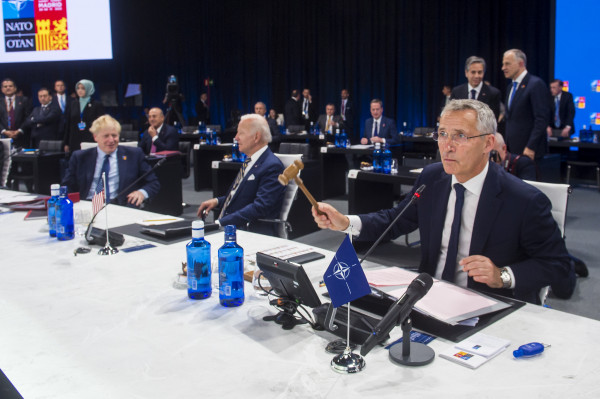NATO's new concept: Russia is threat No 1
Eight years after Russia's invasion of Ukraine, NATO has finally officially named Russia for what it really is - the Alliance's greatest threat. Member states' defense plans will be rewritten in line with NATO's new Strategic Concept, and in much less time than it took to come to the fundamental realization that Russia has gone from ally to enemy.
The previous Strategic Concept was adopted in 2010 in the presence of the then President of the Russian Federation, Dmitry Medvedev, which "saw Russia as a strategic partner of NATO in mitigating various threats, such as cooperation in defending European territory from ballistic missile attacks". Now, Russian missiles are the biggest threat to Europe and NATO is preparing to deter a possible Russian attack. A 360-degree defense is being put in place and every Member State will be protected. The Baltic Sea region did not appear at all in the previous concept. In the new concept, it appears in one paragraph. But this emphasis is enough for Latvia, Lithuania and Estonia to demand deterrence and defense plans adequate to the threat. With guest soldiers, armaments of all classes, safe skies and protection from biological, chemical and even nuclear weapons.
The possibility of an attack cannot be ruled out
The key document on which to build and sustain NATO's deterrence and defense architecture in the years to come has been adopted and can be read in English here: NATO Strategic Concept 2022. The document addresses a range of possible threats, challenges and responses. Terrorism, climate change, China and others, but there is only one source of threat to which the word enemy can be safely applied: the Russian Federation. All 30 NATO Member States have been able to agree on this. Here is what the introductory part of the document says about Russia:
"The Euro-Atlantic area is not at peace. The Russian Federation has violated the norms and principles that contributed to a stable and predictable European security order. We cannot discount the possibility of an attack against Allies’ sovereignty and territorial integrity." And then, in paragraph 8, comes the most important sentence:
"The Russian Federation is the most significant and direct threat to Allies’ security and to peace and stability in the Euro-Atlantic area.
It seeks to establish spheres of influence and direct control through coercion, subversion, aggression and annexation. It uses conventional, cyber and hybrid means against us and our partners. Its coercive military posture, rhetoric and proven willingness to use force to pursue its political goals undermine the rules-based international order."
Only Russia can change relations
The document goes on to say that the Russian Federation is modernizing its nuclear forces, expanding its new and subversive systems with the aim of destabilizing the security situation in countries to the east and south. In the High North, Russia's ability to disrupt the movement of allied forces and freedom of navigation in the North Atlantic is a strategic challenge for the Alliance. Finally, there is also the only sentence that refers specifically to our region:
"Moscow’s military build-up, including in the Baltic, Black and Mediterranean Sea regions, along with its military integration with Belarus, challenge our security and interests." NATO does not seek confrontation, but neither does it pretend that there is no threat. Russia's hostile actions will be responded to in a united and responsible manner - by strengthening the deterrence and defense capabilities of allies, increasing resilience to Russian pressure and supporting partners' resistance to aggression. Future relations between the Alliance and Russia "depends on the Russian Federation halting its aggressive behavior and fully complying with international law".
What works today may not work tomorrow

NATO's new Strategic Concept is a public document and only outlines courses of action. Specific actions to be taken and military options will be spelled out in secret defense plans. Latvian politicians have returned from Madrid seemingly satisfied with what they have achieved. President Egils Levits notes that "the decisions taken at the Madrid Summit integrate Latvia's security needs into NATO's plans and policies". Defense Minister Artis Pabriks also believes that Latvia has achieved what it wanted. Moreover, in the negotiation process, we have been insistent demanders, not supplicants.
LETA has unofficial information that the Baltic states blocked the summit agreement plans until the last moment in the final negotiations in order to reach decisions important for their security, and Latvia was the last one to insist on improvements until the necessary compromises were reached. But it must also be admitted that if the outcome of the Madrid summit had been less good or even bad for Latvia, no one would have been boasting about it anyway.
We will probably soon see how NATO's new 360-degree defense plans will translate into practice for Latvia. More visiting troops, more heavy weapons, safer skies, more reinforcements are promised. We will even have to build a new military base to accommodate all these goodies. But there is no basis to rest on laurels that we are now completely safe. Russia is still right there, just as crazy and just as unpredictable. And, as Foreign Minister Edgars Rinkēvičs concludes in his comments on the results of the Madrid summit: "The international situation is constantly changing, what was good yesterday is not good today, the adequate decisions of today are insufficient tomorrow. That is why nothing ends today, the concern for our security and defense continues."